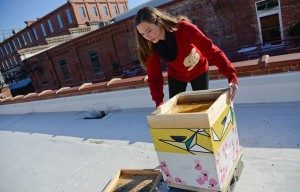
You’ve heard of rooftop gardens atop high-rise urban buildings but what about rooftop bee hives?
That’s NC State student Leigh-Kathryn Bonner’s solution to the worldwide bee shortage: let’s bring bees back to the city and let’s start this movement in Durham, N.C.
On downtown Durham’s historic American Tobacco campus, more than 120,000 new honey bees are already abuzz because of Bonner’s new nonprofit called Bee Downtown. In addition to adding hives of these powerful pollinators on urban rooftops, Bee Downtown also exists to provide educational programming that promotes urban beekeeping.
“Honey bees are incredibly important to our environment and economy,” Bonner said. “We chose to start Bee Downtown in an urban setting because recent studies show bees are actually healthier in urban areas.”
Worldwide, honey bees are on the decline, growing increasingly vulnerable to colony collapse disorders that kill tens of thousands of bees at a time. Since bees are primary pollinators of crops, a bee shortage creates a serious threat to global agriculture production.
A third generation beekeeper, Bonner developed the concept for Bee Downtown while studying abroad in Spain, where she read an article about rooftop beekeeping. When she returned to the Triangle and her internship at American Tobacco Campus in Durham, she wrote a proposal to bring bees to the roofs of the Bull City. American Tobacco said yes and funded the first two hives, which are atop the campus’ power plant building.
Next, Bee Downtown launched the largest bee observation hive in North Carolina at Burt’s Bees headquarters on the American Tobacco Campus. The hive’s clear walls enable thousands to peer inside a bee kingdom to watch the worker bees and try to sneak a peak of the queen bee.
Bee Downtown also offers classes, workshops for children and private tours of the rooftop hives.
“The goal is to make Durham the model city for urban beekeeping and to teach the community about bees – about why honey bees are important and what our world would be like without them,” said Bonner, an International Studies and Spanish major with a minor in Nonprofit Studies.
Bee Downtown offers hive sponsorships through which a company can finance the installation and maintenance of a rooftop hive. Local artists even paint the company’s logo on the hive so that the honey bees know which hive is their home.
A multi-winner in Entrepreneurship Initiative’s LuLu eGames, many NC State programs have helped Bee Downtown take flight: the Entrepreneurship Initiative, the Institute of Nonprofits and its social entrepreneurship initiative, and the Department of Entomology.
Bonner hopes to scale Bee Downtown to the 100 largest cities in the United States.